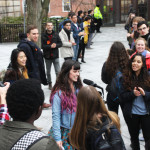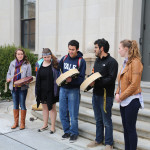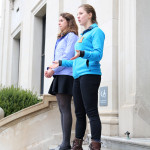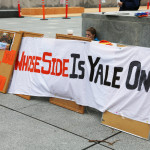Months after promising to escalate its tactics in the wake of the Yale Corporation’s refusal to divest from fossil fuels, Fossil Free Yale staged a sit-in inside Woodbridge Hall.
Shortly before 9 a.m. Thursday morning, 48 members of FFY entered the seat of the Yale administration and refused to leave unless the administration “publicly [committed] to reconsider fossil fuel divestment, and [explained] why the conversation on divestment needs to be reopened.” During the afternoon, roughly 150 protesters congregated outside the building, encircling it in a human chain.
Yale Police Department Chief Ronnell Higgins then issued a 5 p.m. deadline for the protesters inside the building to exit. Nineteen, however, chose to remain, leading Higgins to threaten arrest.
“If anyone here does not want to leave, then you will be arrested,” Higgins told the students.
The 19 were then issued “infraction tickets,” which carried a $92 fine.
But in the hours after the students walked out of the back entrance of Woodbridge Hall, waving their tickets before a cheering crowd, conflicting reports of the punitive measures emerged — notably, whether the students had, in fact, been arrested.
University spokesman Tom Conroy maintained that no students were arrested. Further, Senior Advisor to the President and Provost Martha Highsmith wrote in an email to the News that the infraction involves paying a fine and the students were not “booked” or arrested. Protesters, however, told a different story.
“They said, this is your arrest, this is your warning to leave or we are going to arrest you,” FFY Communications Coordinator Chelsea Watson ’17 said. “We did not leave, so they arrested 19 students in the building.”
Watson added that members of FFY left Woodbridge Hall with the understanding that they had been arrested and described the change in the University’s language as “strategic.”
“They showed they would rather arrest their students than actually engage in a conversation with us,” said FFY organizer Alexandra Barlowe ’17, one of the 19 students. “I think it is pretty disgusting. But it just makes me feel all the more excited to keep fighting and they should expect to hear more from us soon.”
FFY Project Manager Mitchell Barrows ’16 said that Higgins called each student one by one to issue the infractions. Barrows added that the students will likely have to appear before the Executive Committee and face any disciplinary action that Yale deems necessary, although he said the specific punishment — which would follow the infractions already issued — is not “set in stone.”
Prior to Higgins’ warning to students, University Secretary and Vice President for Student Life Kimberly Goff-Crews told students that their failure to leave the building at 5 p.m. might result in their “temporary or permanent separation from the University.”
“There are offenses that are subject to disciplinary action,” she said, citing the Undergraduate Regulations. “Among them are … participation in any effort to prevent or disrupt a class or any other University function, or to seize or occupy any University building.”
Goff-Crews said that the University has a clear process for hearing student concerns regarding the University’s investment policy. She encouraged students to work through the Advisory Committee on Investor Responsibility, whose members are then responsible for conveying student opinions to the Yale Corporation Committee on Investor Responsibility.
Further, Highsmith said University President Peter Salovey met with students Thursday and will communicate their sentiments to the Corporation.
Almost immediately after the members of FFY entered the building, Salovey addressed them. According to Pilar Montalvo, the director of administrative affairs for the President’s Office, Salovey suggested that FFY stay in touch with the ACIR and work through its chair, law school professor Jonathan Macey LAW ’82. She added that when FFY asked to have direct contact with the CCIR, Salovey replied that he would “certainly pass along that message.”
But FFY responded with a new set of demands, this time further detailing the conditions under which they would voluntarily leave the administrative premises.
“So that we are negotiating in good faith, for us to leave, [the administrative response] should include not only that the Corporation is ‘open to hearing new arguments’ as President Salovey claimed,” the letter detailing FFY’s revised demands read. “Instead, this statement should explicitly state the arguments on which it will reconsider divestment.”
Goff-Crews told students that the administration will share FFY’s new statement with the entire Corporation.
However, without the confirmation that the question of divestment would be reconsidered by the CCIR, members of FFY said they felt they had no choice but to remain in the hall.
While the protesters formed a human chain around Woodbridge, Ward 1 Alder Sarah Eidelson ’12 talked with Higgins on the steps of the building. She was initially unsuccessful in gaining entrance, but Higgins later allowed her in.
In an interview with the News after the protest, Eidelson said that, while in the building, she sought to ensure the students’ rights were not being violated.
“The freedoms they’re exercising — the freedom to protest and the freedom to get an actual fair hearing for their concerns — are extremely serious rights,” she said.
In the seven months since the CCIR’s recommendation against divestment, FFY has staged a number of protests outside Woodbridge Hall. Watson said that working through official administrative channels, such as meeting with the ACIR, has been “completely ineffective,” thus necessitating direct confrontation with the administration.
“We felt the need to demonstrate that we take this issue seriously, we take our future seriously,” Barrows said. “If we are willing to take this risk and show that we mean business, maybe the Corporation and President Salovey will see that and take this issue more seriously.”
Barrows described this sit-in as part of FFY’s escalation of pressure on the administration to reopen the question of divestment. He added that when the members of FFY first entered Woodbridge, the staff on hand was “a little shell-shocked” but the group had been received with respect.
But even after leaving with the tickets in hand, protestors felt the sit-in was successful.
Barlowe said FFY does not plan to renew the sit-in on Friday. But the group will continue to increase pressure on the administration in the coming weeks.
“We came here to make a point and we made that point,” Barrows said.
This article has been updated to reflect the version published in print on April 10, 2015.
Clarification, April 9:
An earlier version of this article suggested that the 19 students had been arrested. Though both the Yale Police Department and members of FFY used the language of “arrest” in describing the punitive measure students received following the Woodbridge Hall sit-in, representatives of the University maintained on Thursday evening the students were not formally arrested but were issued infraction tickets — a penalty that does not appear on Department Of Justice criminal records.
















